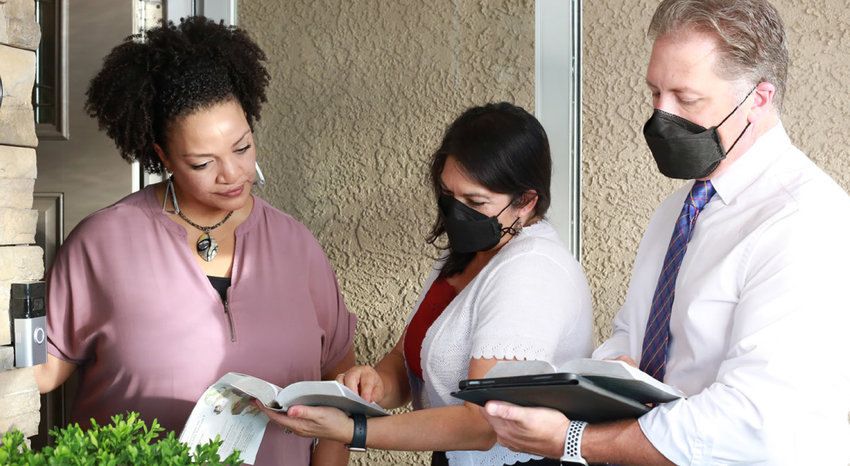Jehovah’s Witnesses will resume their trademark door-to-door ministry beginning Sept. 1.

The 2.5-year suspension of the work will end just in time for the launch of a global campaign featuring an interactive program for Bible study, according to a release.
The decision to resume their door-to-door ministry marks the complete restoration of all pre-pandemic in-person activities for the nearly 1.3 million Jehovah’s Witnesses in the 12,000 congregations in the U.S. Houses of worship (called Kingdom Halls) were reopened on April 1, witnessing in public places resumed on May 31 and in-person conventions are again being planned for 2023.
“I missed being able to read an encouraging scripture from the Bible to (an) individual and see their positive reactions,” said Simon Tanner, whose family will be heading out to nearby neighborhoods in the coming weeks. “Knocking on our first door will be especially exciting.”
The suspension of the public ministry was a proactive response by the organization to keep communities and congregants safe. The move was also unprecedented. Jehovah’s Witnesses had been preaching from house to house without interruption for more than 100 years through an economic depression, two world wars and global unrest, but COVID-19 demanded a different response.
“We believe that the early decision to shut down all in-person activities for more than two years has saved many lives,” Robert Hendriks, U.S. spokesperson for Jehovah’s Witnesses, said in the release. “We’re now ready and eager to reconnect with our neighbors once again – person-to-person, face-to-face. It’s not the only way that we preach, but it has historically been the most effective way to deliver our message of comfort and hope.”
The return to an in-person ministry coincides with a global campaign to offer an interactive Bible study program, available in hundreds of languages and offered at no cost. The course comes in the form of a printed book, online publication or as an embedded feature within the organization’s free mobile application, JW Library. Released in late 2020, the interactive study platform combines text, videos, illustrations and digital worksheets to help learners of all ages.
“This study program is designed to match the learning style of the 21st-century student,” said Hendriks. “We’re excited to begin sharing it with our neighbors as we return to making personal visits.”
The pandemic forced Jehovah’s Witnesses to pivot to virtual meetings and conventions while conducting their ministry exclusively through letters, phone calls and virtual Bible studies. This has led to growth in meeting attendance and the number of congregants, with more than 400,000 newly baptized Witnesses joining the ranks of 120,000 congregations globally in just the first two years of the pandemic.
“You can immediately show compassion and empathy in your face,” Stephen Mills, who became one of Jehovah’s Witnesses during the pandemic, said in the release. “(People) need to see another face that actually cares about them … that’s what they need.”
For more information about Jehovah’s Witnesses, their history, beliefs and activities, visit their official website, jw.org, with content available in more than 1,000 languages.





